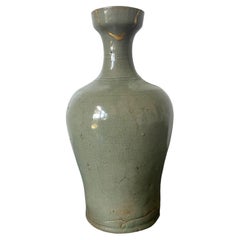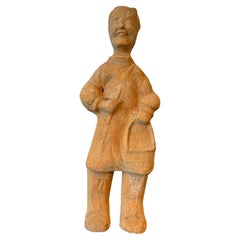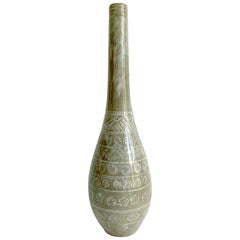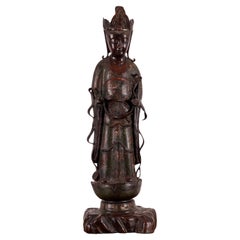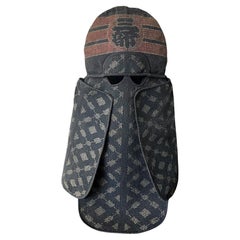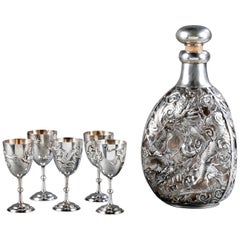Georgia - Asian Art and Furniture
15th Century and Earlier Korean Archaistic Antique Georgia - Asian Art and Furniture
Ceramic
15th Century and Earlier Chinese Archaistic Antique Georgia - Asian Art and Furniture
Clay
19th Century Japanese Japonisme Antique Georgia - Asian Art and Furniture
Ceramic
Late 19th Century Japanese Meiji Antique Georgia - Asian Art and Furniture
Bronze
Early 1900s Japanese Japonisme Antique Georgia - Asian Art and Furniture
Cotton
Early 20th Century Chinese Chinese Export Georgia - Asian Art and Furniture
Sterling Silver
19th Century Korean Folk Art Antique Georgia - Asian Art and Furniture
Brocade, Wood, Paper
Early 1900s Japanese Japonisme Antique Georgia - Asian Art and Furniture
Porcelain
1950s Chinese Chinoiserie Vintage Georgia - Asian Art and Furniture
Metal
Late 19th Century Chinese Chinoiserie Antique Georgia - Asian Art and Furniture
Silk, Giltwood
Early 2000s Japanese Organic Modern Georgia - Asian Art and Furniture
Ceramic
1980s American Modern Vintage Georgia - Asian Art and Furniture
Ceramic
19th Century Korean Antique Georgia - Asian Art and Furniture
Ceramic
17th Century Chinese Antique Georgia - Asian Art and Furniture
Porcelain
15th Century and Earlier Chinese Archaistic Antique Georgia - Asian Art and Furniture
Earthenware, Stucco, Petrified Wood
Early 20th Century Japanese Japonisme Georgia - Asian Art and Furniture
Malachite, Sterling Silver
Early 1900s Japanese Japonisme Antique Georgia - Asian Art and Furniture
Porcelain
1950s Japanese Chinoiserie Vintage Georgia - Asian Art and Furniture
Metal, Bronze
18th Century Japanese Edo Antique Georgia - Asian Art and Furniture
Silk, Paper
20th Century Chinese Chinese Export Georgia - Asian Art and Furniture
Wood
1910s Japanese Japonisme Vintage Georgia - Asian Art and Furniture
Ceramic
Mid-20th Century American Modern Georgia - Asian Art and Furniture
Ceramic
17th Century Korean Other Antique Georgia - Asian Art and Furniture
Ceramic
17th Century Chinese Antique Georgia - Asian Art and Furniture
Porcelain
19th Century Japanese Antique Georgia - Asian Art and Furniture
Porcelain
19th Century Chinese Antique Georgia - Asian Art and Furniture
Pewter
16th Century Chinese Ming Antique Georgia - Asian Art and Furniture
Stoneware
16th Century Japanese Japonisme Antique Georgia - Asian Art and Furniture
Silver, Iron
20th Century Japanese Modern Georgia - Asian Art and Furniture
Ceramic
17th Century Korean Other Antique Georgia - Asian Art and Furniture
Ceramic
16th Century Chinese Ming Antique Georgia - Asian Art and Furniture
Porcelain
15th Century and Earlier Indian Archaistic Antique Georgia - Asian Art and Furniture
Sandstone
Late 19th Century Japanese Meiji Antique Georgia - Asian Art and Furniture
Silk, Wood
1890s Japanese Meiji Antique Georgia - Asian Art and Furniture
Cotton, Linen
19th Century Korean Other Antique Georgia - Asian Art and Furniture
Ceramic
Mid-20th Century Chinese Tribal Georgia - Asian Art and Furniture
Textile
Early 20th Century Japanese Meiji Georgia - Asian Art and Furniture
Ceramic
Early 20th Century Japanese Japonisme Georgia - Asian Art and Furniture
Bamboo
Late 19th Century Japanese Meiji Antique Georgia - Asian Art and Furniture
Ceramic
Early 20th Century Japanese Meiji Georgia - Asian Art and Furniture
Porcelain
Late 19th Century Korean Other Antique Georgia - Asian Art and Furniture
Iron
19th Century Japanese Antique Georgia - Asian Art and Furniture
Porcelain
Early 19th Century Chinese Chinese Export Antique Georgia - Asian Art and Furniture
Porcelain
Early 19th Century Korean Other Antique Georgia - Asian Art and Furniture
Iron
18th Century Japanese Japonisme Antique Georgia - Asian Art and Furniture
Ceramic
15th Century and Earlier Thai Archaistic Antique Georgia - Asian Art and Furniture
Ceramic
Mid-20th Century Japanese Modern Georgia - Asian Art and Furniture
Bamboo, Rattan
15th Century and Earlier Korean Archaistic Antique Georgia - Asian Art and Furniture
Ceramic
20th Century Japanese Organic Modern Georgia - Asian Art and Furniture
Ceramic, Wood
16th Century Korean Other Antique Georgia - Asian Art and Furniture
Ceramic
Early 2000s Japanese Modern Georgia - Asian Art and Furniture
Bamboo, Rattan
Mid-20th Century American Modern Georgia - Asian Art and Furniture
Ceramic
Late 19th Century Japanese Japonisme Antique Georgia - Asian Art and Furniture
Rattan, Wood, Lacquer
19th Century Chinese Chinese Export Antique Georgia - Asian Art and Furniture
Wood
15th Century and Earlier Thai Archaistic Antique Georgia - Asian Art and Furniture
Stucco, Wood
Late 20th Century Japanese Modern Georgia - Asian Art and Furniture
Bamboo, Rattan
1850s Japanese Edo Antique Georgia - Asian Art and Furniture
Paper
19th Century Thai Other Antique Georgia - Asian Art and Furniture
Gold Leaf
15th Century and Earlier Chinese Antique Georgia - Asian Art and Furniture
Pottery
Early 20th Century Japanese Japonisme Georgia - Asian Art and Furniture
Silk, Beads
Read More
Symbols of Happiness and Rebirth Adorn This Japanese Satsuma Bowl
Decorated with white cranes and the sought-after thousand-butterflies motif, the Meiji-period vessel offers both a celebration of traditional aesthetics and a clear reflection of the era’s appetite for exquisite export pieces.
Chicago’s Pagoda Red Has a Spirited Mix of Asian Antiques and Bold New Art
For 25 years, gallerist Betsy Nathan has leveraged her keen eye and key connections to bring a unique selection of rare finds to the market.
In L.A., Gallerist JF Chen Has Long Championed Eclectic Blue-Chip Design
Now working alongside his daughter Bianca, dealer Joel Chen has presented a most covetable array of antiques, art and contemporary creations for more than 40 years.
12 Calming Spaces Inspired by Japanese Design
From cherry-blossom-adorned walls paired with glamorous lighting to wood-paneled ceilings above checkerboard-patterned chairs, these 12 spaces seamlessly blend Eastern and Western aesthetics.
Rodrigo Rivero Lake’s Mexico City Showroom Is a Museum-Worthy Trove of Spanish Colonial and Asian Antiques
The dealer and curator has spent the past 50 years amassing a collection of exceptional art, furniture and architectural elements that trace the cultural influence of the Spanish empire from Europe to the Americas and beyond.
16 Refined Asian-Inspired Interiors
These spaces exemplify how Eastern elements elevate a home's decor.
